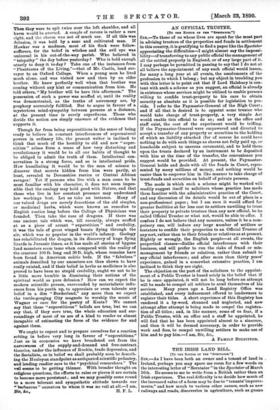AN OFFICIAL TRUSTEE.
[To FRI EDITOR OF TIM "Brzorkroa."] SIR,—To those of us whose lives are spent for the most part in advising trustees of the properties and funds in settlement in this country, it is gratifying to find a paper like the Spectator
appreciating the difficulties—I might almost say the impossi- bility—of transferring to any public official the management of
all the settled property in England, or of any large part of it. I may perhaps be permitted in passing to say that I do not at all believe the appointment of any such official would lessen, for many a long year at all events, the emoluments of the profession to which I belong ; but my object in troubling you with this letter is to point out that if Lord Halsbury is con- tent with such a scheme as you suggest, an official is already in existence whose services might be utilised to enable persons willing to confide trust-property to his care to obtain security as absolute as it is possible for legislation to pro- vide. I refer to the Paymaster-General of the High Court; and if all that is desired is to appoint some trustee who would take charge of trust-property, a very simple Act would enable this official to do so; and as the office and staff exist, the cost of the experiment would be trifling. If the Paymaster-General were empowered and directed to, accept a transfer of any property or securities to the holding of which no liability attached (for of course he could have nothing to do with such things as shares not fully paid up, or leaseholds subject to onerous covenants), and to hold them. upon the trusts declared by an instrument to be deposited with him at the time of the transfer, the convenience you suggest would be provided. At present, the Paymaster- General holds and deals with all the funds in Court, repre- sented by many millions of money, and nothing would be easier than to empower him in like manner to take charge of trust-funds and securities on behalf of private persons.
The mode in which such a scheme might be worked will readily suggest itself to solicitors whose practice has made them familiar with the administrative practice of the Court, and any discussion of its details would be out of place in a non-professional paper ; but I am sure it would afford far- greater facilities at far less cost to settlers unwilling to trust their property to private trustees than any new official, be he called Official Trustee or what not, would be able to offer. I confess I do not believe that any measure, unless it be a com- pulsory one, will induce any large number of settlers or testators to confide their properties to an Official Trustee of any sort, rather than to their friends or relatives as at present. Rightly or wrongly, the English people—at all events, the propertied classes—dislike official interference with their business, and will prefer to run the risks of fraud or mis- management by friends or relatives, rather than submit to any official interference ; and after more than thirty years' experience, gained in a somewhat extensive practice, I am. inclined to think they are right.
The objection on the part of the solicitors to the appoint- ment of a Public Trustee is based solely in the belief that if he is once appointed, it will not be long before an attempt will be made to compel all settlers to avail themselves of his services. Many years ago a Land Registry Office was established, and every inducement offered to landowners to register their titles. A short experience of this Registry haa rendered it a by-word, shunned and neglected, and now attempt after attempt is being made to compel the registra- tion of all titles ; and, in like manner, some of us fear, if a Public Trustee, with an office and a staff be appointed, he will find that he has been appointed almost to a sinecure, and then it will be deemed necessary, in order to provide work and fees, to compel unwilling settlers to make use of him and to pay him.—I am, Sir, 8rc., A FAMILY SOLICITOR.






































 Previous page
Previous page